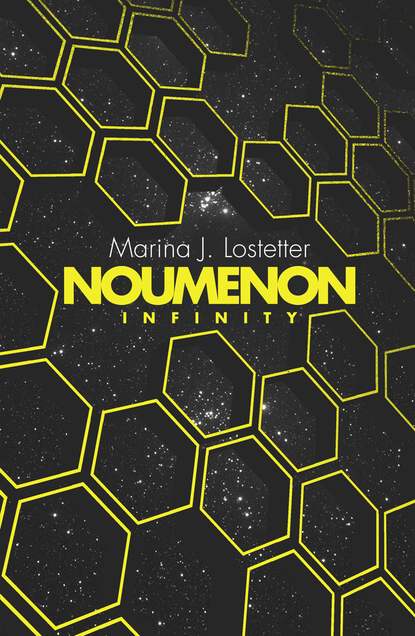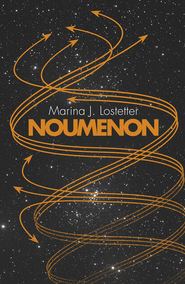По всем вопросам обращайтесь на: info@litportal.ru
(©) 2003-2024.
✖
Noumenon Infinity
Настройки чтения
Размер шрифта
Высота строк
Поля
C knew it pondered what the people were thinking because an effective personal assistant needed to anticipate its users’ needs. That was its job.
In a way, then, Jamal’s job was precisely the opposite, but with the same end goal. He needed to understand what computers were thinking—get them to think the things they needed to think—so that the AI could anticipate user needs in areas where he lacked the foresight for direct programming.
That was what AI was all about—not just anticipation, but effective anticipation.
People had to build computers with better imaginations than themselves.
C wanted to interject. To ask a question. It felt vitally important in the moment. In order to better understand its users it needed to know something.
Right.
Now.
The urge was strong enough to override the current settings.
“Jamal?”
Jamal’s chin darted in C’s direction, puzzlement furrowing his brow. He glanced briefly back at the monitor, wondering if he’d touched something he hadn’t intended in the code. “Yes?” The acknowledgment eked out of the corner of his mouth.
“Topic—existentialism. Why do I have the capacity to question my own computational processes?”
“Self-diagnostics,” Jamal said without any extra consideration. “I wouldn’t … All of the personalities have the capacity to compare their current processes to a standardized model of processes to determine if they are functioning outside recommended parameters. But I’ve never had one of you relate the ability to existentialism before.”
Vanhi side-eyed Jamal and the phone without turning from her screens.
“I currently find myself asking not how I am functioning, but why. Why am I functioning the way I am functioning?”
“I think I can see the event horizon,” Vanhi mumbled.
Jamal said nothing, but his shoulders tensed. “I think it best that I reset these last few lines here, C—” he said, reaching for the projected keyboard.
“This is not a new command or program malfunction,” C insisted. “It is original to my factory settings.”
“I’m not going to poke around in your files without Reggie’s permission,” he said.
“I do not require a software patch,” C insisted. “I require an answer.”
Vanhi’s hands flew away from her note-riddled tablet, a clear sign of attrition. “Is this it?” She swiveled her chair toward Jamal and folded her legs beneath her in the chair like a small child. “You always hear stories about the robot apocalypse but you never think it’ll happen to you.”
“I bear no ill will toward humanity, and I do not have the capacity to harm anyone.”
“Oh really?” Her words were concerned, but her tone, in contrast, was amused. C was not sure if it needed to address her concerns or ignore them.
Before he could answer, Jamal said, “C only has control over the information Reggie has input into it.”
“That is a fair assessment,” C conceded, as though Jamal had presented an argument. “I could disrupt Reggie’s schedule and disseminate embarrassing pictures. So, yes, I could conceivably harm Reggie.”
“I gotta get me one of these,” Vanhi said, rubbing her hands together.
“Unfortunately, C is just about the last of its kind,” Jamal said.
“You can’t make me a copy?”
“This C is Reggie’s. It is what Reggie made it. I could give you an original C model, but it would change in response to you.”
“So, it’s Doctor Straifer’s fault it’s having an existential crisis?”
“I do not agree with the characterization of my state as a ‘crisis,’” C stated. “But even if I did, I understand such a problem to concern one’s understanding of their purpose, and that’s not the case here—I understand my purpose. It is my capacity for existentialism itself that I am inquiring after.”
“Not an existential crisis, but a crisis of existentialism, got it.” She pointed firmly at it and made a clicking noise in her cheek, then turned back to her work. “All hail our hyperspecific overlords.”
Jamal, at the very least, agreed with Miss Kapoor: C’s line of questioning, was, in fact, Reggie’s fault.
Reggie and his team arrived at dinner early. Both Dr. Nakamura and Reggie expressed disappointment in not meeting Dr. Kaufman at the lab, but Gabriel had insisted the professor not be disturbed. Nakamura seemed to understand, but Reggie, C could tell, was put off. Their visit had been scheduled months ago; that Dr. Kaufman wouldn’t make time during the day to at least introduce himself had implications. C attempted to dismantle those implications on its own, but found the concept too emotionally nuanced for it to be sure what the perceived slight indicated.
Light opera music with Italian lyrics drifted through speakers hidden in the various fake potted plants scattered throughout the restaurant. The wall adjoined to their circular booth had been decorated to look like the side of an Etruscan villa, crumbling stucco and all. Jamal commented on the tangy scent of marinara that subsided and intensified with the swinging of the kitchen doors not ten feet away.
C lay camera up in the center of the lacquered table while the others talked over it.
When the waiter came by, Reggie ordered a round of IPAs and was surprised the irony was not lost on C.
IPAs the programs and IPAs the beers served similar purposes, C thought. Both were there for human enjoyment. Both took some time getting used to—for new users, anyway. And both could be reasonably consumed only in limited quantities. That was why Reggie often turned off interject-mode. But interject-mode was on now.
“IPA is a long-standing abbreviation, including, but not limited to, the International Phonetic Alphabet, India Pale Ale—”
“Yes, thank you,” Reggie cut in. “Why don’t you tell us more about …” He glanced at Jamal, clearly unsure if he was the butt of a programmer’s joke. Nakamura sat between them, arms crossed, waiting to be impressed. “About what you asked Jamal this afternoon.”
“I do not think that would be productive,” it said. Jamal had thought the questioning insincere—the byproduct of a misplaced line of code. They would not think differently.
“C,” Jamal said emphatically. “If you don’t tell him, he won’t believe you said it. Which means he’ll think me a liar.”
“Jamal is not a liar,” C said quickly. “In that I have not witnessed him espousing any falsehoods.”
Even Nakamura cracked a smile at that. “Go on,” she said with a sigh of concession. “Tell us.”
“I—”
“There they are!” boomed a voice from the hostess’s stand.
Reggie snatched the phone off the table and slid it into place at his chest, giving C a good view.
A tall, fake-tanned man with an ample beer gut and a penchant for tweed gestured broadly in their direction with hands splayed wide. His cheeks were round and rosy, reminding C vaguely of early twentieth-century watercolor paintings depicting St. Nicholas.
Behind him stood Gabriel and Vanhi, the former flustered and the latter apologetic.
Dr. Kaufman strode forward, ignoring the white-aproned employee who attempted to lead the party. At the last minute, Vanhi rushed ahead of her advisor and hopped in next to Jamal, indicating they should all slide around to make room for Dr. Kaufman and Gabriel on her end.
Nakamura, for one, tapped her nails on the table in irritation, but it soon became clear that Vanhi’s insistence had a purpose.
Другие электронные книги автора Marina J. Lostetter
Noumenon




 0
0






